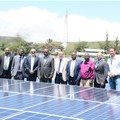In South Africa access to reliable and affordable power is becoming increasingly problematic, resulting in farmers switching to alternative power sources from renewable energy. Solar energy, as well as other renewable sources such as wind and hydro, enables farmers and agribusinesses to continue operating when there are interruptions due to load-shedding or cable theft, thus ensuring that productivity is not affected.
The impact that load-shedding or power cuts can have on a farming operation - especially those that depend on electricity for their irrigation, packhouse cooling systems and abattoir cold rooms - can be severe for that business as well as the economy.

©Joerg Hackemann via
123RFJohn Hudson, national head of agriculture for Nedbank, says that Nedbank, for example, is committed to developing solutions that will ensure the sustainability of the agricultural sector and that its leadership position in renewable-energy finance is helping many farmers and agribusinesses to benefit from more cost-effective and cleaner power generation than the national grid can provide.
"The global Sustainable Development Goals (SDGs) have been developed as the blueprint for achieving a better and more sustainable future for all. Nedbank, for example, has prioritised nine of the 17 global SDGs as these potentially entail banking solutions and so guide its sustainable development activities."
Through this funding, three SDGs are being met, namely:
• SDG 7: Affordable and clean energy;
• SDG 12: Responsible consumption and production; and
• SDG 15: Life on land, if renewable energy allows for continued irrigation.
A recent innovation financed by Nedbank, for example, is South Africa's first commercial floating solar farm. The owners of the solar farm started investigating renewable-energy projects in 2018 because of the increasing costs of electricity and the carbon emissions associated with it.
The pioneering solar park can produce 60 kW of energy and is now used to power almost everything on the farm, from irrigation pumps to the machinery used in the packaging of fruit for export. Infrastructure has been installed to allow for a battery system, which will take the farm completely off the grid in the second phase of the project. Importantly, this innovative solution also does not use productive land to generate power – which can cost up to R3m per hectare in the Western Cape – and reduces evaporation by up to 80%.
Hudson advises that agribusinesses that wish to apply for renewable-energy finance should shop around for suppliers, equipment and solutions as they would for any acquisition of a large asset. "Research different technologies, pricing, guarantees and post-sales maintenance. Obtain quotes and specifications to compare the generation outputs, costs and equipment with your research and the various suppliers' offerings."
"It's also a good idea to speak to fellow farmers and agribusiness owners who have embarked on the renewable-energy journey to gain insight into the performance and professionalism of their installers. Remember to determine their level of satisfaction with the actual energy delivery and use against the promised specifications."
He adds that when applying for finance, agribusiness owners should ensure that the specifications, invoices, agreements or contracts supplied by the installer accompany the operation’s financial records and electricity bills.

































